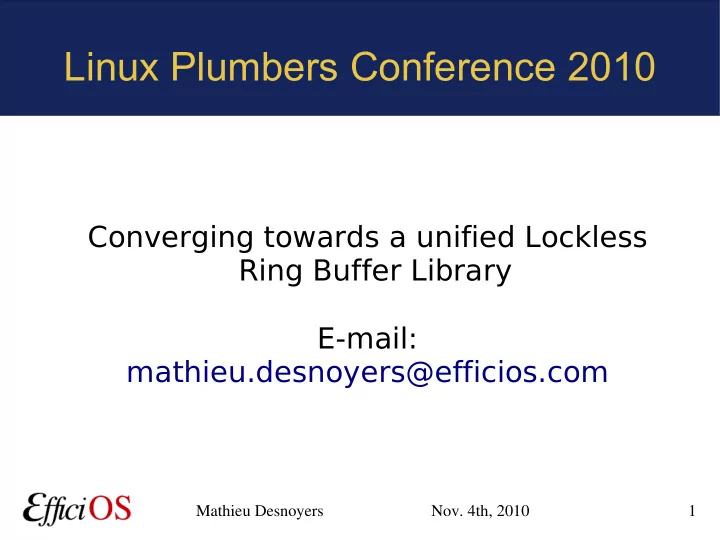

Linux Plumbers Conference 2010 Converging towards a unified Lockless Ring Buffer Library E-mail: mathieu.desnoyers@efficios.com Mathieu Desnoyers Nov. 4th, 2010 1
> Presenter ● Mathieu Desnoyers ● EfficiOS Inc. ● http://www.efficios.com ● Author/Maintainer of ● LTTng, LTTV, Userspace RCU Mathieu Desnoyers Nov. 4th, 2010 2
> Plan ● Tracing User Requirements ● Generic Ring Buffer Library ● Standard Trace Format ● Modular Instrumentation ● Fast Global Trace Clock – Hypervisor, kernel, userland (vDSO) ● Discussion Mathieu Desnoyers Nov. 4th, 2010 3
> State of Linux tracers ● Ftrace, Perf – Opening the Linux kernel developer community to tracing – Centered on kernel developers requirements – Still missing the point for companies developing on top of Linux (end users) ● Telecommunication companies ● Embedded systems ● Enterprise servers ● And many many more ....................................... Mathieu Desnoyers Nov. 4th, 2010 4
> User requirements (1) Reflects the needs of the following users: – Monta Vista – IBM – Autodesk – Ericsson – Cisco – Nokia – Mentor Graphics – Siemens – Texas Instruments – Freescale – Wind River Mathieu Desnoyers Nov. 4th, 2010 5
> User requirements (2) ● Compactness of traces – e.g. 96 bits per event (including typical 64-bit payload), no PID saved per event ● Production-grade tracer reliability – Trace clock accuracy within 100ns, ordering based on lock/interrupt handler knowledge, ability to know when ordering might be wrong ● Scalability to multi-core and multi-processor – Per-CPU buffers, time-stamp reading scalable Mathieu Desnoyers Nov. 4th, 2010 6
> User requirements (3) ● Low-overhead is key – 150 ns per event (cache-hot) – Zero-copy (splice to disk/network, mmap for zero-copy data analysis) ● Flight recorder mode – Support concurrent read while writer is overwriting buffer data (snapshots) Mathieu Desnoyers Nov. 4th, 2010 7
> User requirements (4) ● Availability of trace buffers for crash diagnosis – Save to disk, network ● Support multiple trace sessions in parallel – Engineer + Operator + flight recorder for automated bug reports Mathieu Desnoyers Nov. 4th, 2010 8
> User requirements (5) ● Heterogeneous environment support – Portability – Distinct host/target environment support – Management of multiple target kernel versions – No dependency on kernel image to analyze traces (traces contain complete information) Mathieu Desnoyers Nov. 4th, 2010 9
> User requirements (6) ● Live view/analysis of trace streams via the network – Impact on buffer flushing, power saving, idle, ... ● System-wide (kernel and user-space) traces ● Scalability of analysis tools to very large data sets (> 10GB) ● Standardization of trace format across analysis tools (MCA TIWG, Eclipse viewer/analyzer, kernelshark, LTTV) Mathieu Desnoyers Nov. 4th, 2010 10
> Generic Ring Buffer Library ● Input – Data received as parameter from ring buffer library clients ● Output – Data available through a global or per-CPU file descriptor with splice, mmap or read. – Or data available internally to the ring buffer client for reading Mathieu Desnoyers August 11th, 2010 11
> Genericity and Flexibility ● Target Ftrace, LTTng, Perf and drivers ● Not only tracer-specific – Ring buffer sits in /lib ● Achieve genericity without hurting performance – Ring buffer clients – Instantiate client-specific configurations – Express configuration into a constant client structure passed as parameter to inline functions Mathieu Desnoyers August 11th, 2010 12
> Common Trace Format (CTF) ● Effort undertaken in collaboration with Multi- Core Association Tool and Infrastructure Workgroup ● Target a standard trace format for Application, Kernel and Hardware tracing ● Linux CTF (Common Trace Format) can influence this standard by being a reference implementation ● Posted many rounds of requirement RFCs, one proposal RFC to LKML Mathieu Desnoyers August 11th, 2010 13
> BabelTrace ● Trace converter to/from CTF ● Aims to help interoperability between tracers and trace analysis tools – Without requiring tracers to change their ABIs immediately Mathieu Desnoyers August 11th, 2010 14
> Modular Instrumentation ● At the very least, each tracer should share the instrumentation infrastructure ● Modularization of instrumentation sources, API standardization – Tracers register with trace session private data – Tracepoints, function tracing – Dynamic probes, kprobes, performance counters, ... Mathieu Desnoyers August 11th, 2010 15
> Fast Trace Clock ● Currently: – Global trace clock non-scalable and slow – "Medium" trace clock too coarse (1HZ) precision ● Need a fast trace clock cpufreq and PM-aware, drift dealt by periodically synchronizing on external clock, readable in NMI context. Mathieu Desnoyers August 11th, 2010 16
> Fast Trace Clock ● Available (and synchronized) across host OS, guest OS and userspace ● Should export through vDSO for user-space tracing ● Should have "get/put" refcounting to activate/deactivate trace clock on ARM Mathieu Desnoyers August 11th, 2010 17
> Discussion ? – http://www.efficios.com – CTF/BabelTrace ● http://www.efficios.com/ctf – Generic Ring Buffer Library ● http://www.efficios.com/ringbuffer Mathieu Desnoyers Nov. 4th, 2010 18
Recommend
More recommend